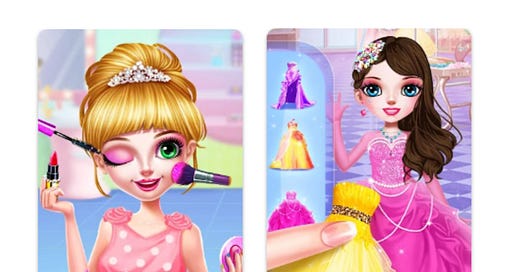Uncovering Gender Bias in Preschool Apps and Games
Introduction
In today’s digital-first world, mobile apps and games are becoming essential tools for early learning, especially in low-income and rural areas where access to preschools or quality early education is limited. While these apps offer new pathways to learning, they also carry hidden messages about gender roles. What are we teaching our children about who they can be, just by what we let them play?
App Store Search Result
A quick search on the Android Play Store reveals a stark divide. Games suggested for girls aged 4 to 6 include nail salons, cooking, dress-up, babysitting, and cleaning. Games for boys, in contrast, feature racing, building, solving puzzles, and heroic rescue missions. These differences may seem harmless at first glance, but they reinforce rigid gender stereotypes at a critical stage of brain development.
Why This Matters in Early Childhood
Research shows that gender bias begins to shape a child’s identity as early as two years old. By the time children reach preschool, they begin to form ideas about what boys and girls can and should do. These early perceptions affect their confidence, curiosity, and future aspirations.
The American Psychological Association (APA) notes that children internalize gender roles through media exposure, which can limit their interest in non-stereotypical activities (APA, 2022).
A 2019 study by UNESCO found that digital learning tools often reflect and reinforce cultural gender norms rather than challenge them.
For children in rural and low-income Indian households, where digital games may be one of the few accessible learning experiences, these early messages can have long-term consequences.
Hidden Lessons in Popular Apps
Analysing the themes and characters in popular preschool apps commonly used in India:
Girls are often shown as caregivers, beauticians, cooks, or homemakers. These roles are nurturing but narrowly defined.
Boys are portrayed as explorers, builders, drivers, or problem-solvers. These roles suggest agency, strength, and independence.
Activities marketed to girls are often passive or appearance-focused, while those for boys encourage risk-taking, logic, and leadership.
This pattern was evident across apps like Princess Makeup Salon, My Baby Pet Care for girls, and Truck Builder, Maze Adventure, Firefighter Rescue for boys.
Consequences for Learning and Development
Children absorb these role models quickly. Girls may grow up less inclined to pursue STEM or leadership roles, while boys may shy away from emotional expression or caregiving tasks. Both lose out.
Inclusive Design: What Can Be Done
The good news is that some platforms are working to counter these trends:
Khan Academy Kids features gender-diverse characters in non-stereotypical roles and encourages creativity, math, and critical thinking for all.
Kutuki includes Indian cultural contexts and stories that portray boys and girls as equals.
Chimple offers a mix of exploratory learning, often without gendered framing.
Recommendations for App Developers and Educators
Diversify Characters 🦸🏻♀️ : Ensure equal representation of boys, girls, and gender-neutral characters in varied roles.
Neutral Themes 🦊 : Focus on universal interests like animals, science, music, and problem-solving.
Cultural Sensitivity ✨: Reflect local contexts without reinforcing regressive norms
Parental Guidance 🧓🏻 : Educate caregivers on choosing balanced content and questioning stereotypes.
Conclusion: Rethinking Play for a Gender-Equal Future
Play is powerful. It shapes how children see the world and their place in it. As we strive to provide equitable learning opportunities for all children, especially in rural and low-income communities, we must ask: Are our digital tools helping every child dream freely? By making intentional, inclusive choices in how we design and distribute preschool apps, we can start closing the gender gap right from the first swipe.
References
American Psychological Association (2022). "How early childhood media influences gender roles."
UNESCO (2019). "I'd Blush If I Could: Closing Gender Divides in Digital Skills through Education."
Khan Academy Kids: https://learn.khanacademy.org/khan-academy-kids/
Kutuki: https://kutuki.in/
Chimple: https://www.chimple.org/







